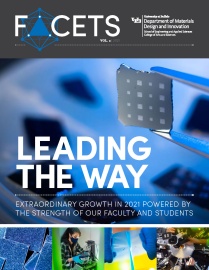Jia elected Fellow of IEEE
Honor recognizes Jia's contributions to coated superconductors and metal-oxide thin films for electronic applications
by Jane Stoyle Welch
Published January 25, 2017 This content is archived.
Quanxi Jia, a world-renowned scholar in materials science at the University at Buffalo, has been elected Fellow of the Institute of Electrical and Electronics Engineers (IEEE).
Jia, PhD, is the Empire Innovation Professor and National Grid Professor of Materials Research in the Department of Materials Design and Innovation (MDI) at UB. He also serves as scientific director of UB’s New York State Center of Excellence in Materials Informatics (CMI).
IEEE recognized Jia for his contributions to coated superconductors and metal-oxide thin films for electronic applications.
Coated superconductors, also known as second generation superconducting tapes, are critical elements for magnets, motors and power transmission lines. Metal-oxides, due to their multi-functionalities and superior properties under extreme conditions, have had profound impacts on the development of next generation electronic devices.
The grade of Fellow is conferred by the IEEE Board of Directors upon a person with an outstanding record of accomplishments in any of the IEEE fields of interest. The total number selected in any one year cannot exceed one-tenth of one-percent of the total voting membership. It is the highest grade of membership and is recognized by the technical community as a prestigious honor and an important career achievement.
"Quanxi's election to a Fellow of IEEE reflects the innovative contributions he has made in the field of materials science. His work exemplifies the mission of the Department of Materials Design and Innovation of advancing novel methods in materials discovery and design," said Krishna Rajan, Erich Bloch Endowed Chair of MDI.
A collaboration between the School of Engineering and Applied Sciences and the College of Arts of Sciences, the MDI department was launched in 2014 to apply information science methods to advanced materials research.
Prior to joining UB earlier this year, Jia was the director of the Center for Integrated Nanotechnologies, a U.S. Department of Energy nanoscale science research center operated jointly by Los Alamos National Laboratory and Sandia National Laboratories.
His research areas include the synthesis and study of structure-property relationships of nanostructured materials, multifunctional materials, and thin films; the development of innovative deposition techniques for the growth of electronic materials; and the development and fabrication of high-temperature superconducting films, novel solid-state microelectronic and electro-optic devices.
He has authored or co-authored more than 470 peer-reviewed journal articles, delivered more than 100 invited lectures, and holds 48 U.S. patents. He serves as the co-editor-in-chief of Materials Research Letters, and sits on the editorial board of several academic and professional journals.
Among his many awards and honors are two prestigious R&D 100 awards, the 2005 Asian-American Engineer of the Year Award, and the Federal Laboratory Consortium for Technology Transfer Awards for Excellence in Technology Transfer. He is an elected Fellow of the Los Alamos National Laboratory, Materials Research Society, American Physical Society, American Ceramic Society and American Association for the Advancement of Science.
Jia received bachelor’s and master’s degrees in electrical engineering from Xian Jiaotong University, China, and a PhD in the same field from UB in 1991.
About IEEE
The IEEE is the world’s leading professional association for advancing technology for humanity. Through its 400,000 plus members in 160 countries, the association is a leading authority on a wide variety of areas ranging from aerospace systems, computers and telecommunications to biomedical engineering, electric power and consumer electronics.
Dedicated to the advancement of technology, the IEEE publishes 30 percent of the world’s literature in the electrical and electronics engineering and computer science fields, and has developed more than 1300 active industry standards. The association also sponsors or co-sponsors nearly 1700 international technical conferences each year. If you would like to learn more about IEEE or the IEEE Fellow Program, please visit the IEEE website.

